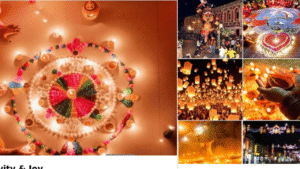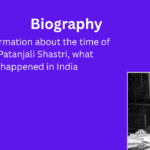As Diwali 2025 approaches, let us resolve to celebrate this sacred festival with purity, harmony, and responsibility. The true essence of Diwali lies not just in lighting lamps and bursting crackers but in igniting the flame of love, unity, and wisdom within our hearts. This year, may we choose to celebrate Diwali 2025 in a way that honors our traditions, respects the environment, and strengthens bonds with family, friends, and society. Instead of indulging in harmful practices, let us embrace the festival as an opportunity to spread kindness, share joy, and make our homes and communities brighter and cleaner.
Why is Diwali Celebrated?
Diwali, also known as Deepavali, is one of the most celebrated festivals in India and across the world by Hindus, Sikhs, Jains, and Buddhists. Its roots are both spiritual and cultural. The word “Deepavali” comes from Sanskrit, meaning “a row of lights.” The festival signifies the victory of good over evil, light over darkness, and knowledge over ignorance.
One of the most cherished legends associated with Diwali is the return of Lord Rama, Sita, and Lakshmana to Ayodhya after 14 years of exile and the victory over Ravana. To honor their arrival, the people of Ayodhya illuminated the city with countless oil lamps, an act that became the foundation of the tradition of lighting diyas.
In many regions, Diwali also commemorates Lord Krishna’s triumph over the demon Narakasura, which represents the victory of positivity over negativity. For Jains, it is deeply spiritual as it marks the moment Lord Mahavira attained moksha (liberation).
Therefore, Diwali is not merely a festival but a powerful symbol of renewal, optimism, and universal harmony.

Which God is Worshipped on Diwali?
The gods worshipped during Diwali 2025 vary slightly depending on tradition and region, but Goddess Lakshmi is the central deity for most Hindus. Lakshmi, the goddess of wealth and prosperity, is worshipped in the hope of inviting good fortune, success, and happiness into homes and businesses.
Along with Lakshmi, Lord Ganesha, the remover of obstacles, is also worshipped on this day. He symbolizes wisdom and new beginnings. Together, Lakshmi and Ganesha represent wealth combined with intellect, ensuring prosperity is used wisely.
Some communities also worship Lord Rama, honoring his return to Ayodhya, and Lord Krishna, celebrating his victory over evil. In regions like West Bengal, Goddess Kali is revered during Kali Puja, which coincides with Diwali night.
Therefore, Diwali 2025 is a day of divine gratitude, where families invoke blessings for a prosperous and peaceful life.
How Do People Celebrate the Festival?
Diwali celebrations in 2025 will, like every year, bring unmatched enthusiasm across India and the world. The festival usually spans five days, with each day carrying special significance:
Dhanteras – The first day marks the worship of Lord Dhanvantari and is considered auspicious for buying gold, silver, and utensils.
Choti Diwali (Narak Chaturdashi) – The second day recalls Lord Krishna’s victory over Narakasura. Homes are cleaned and decorated.
Main Diwali Day – The third day is the grand celebration with Lakshmi and Ganesha Puja, lighting diyas, and exchanging gifts.
Govardhan Puja, also called Annakut, is observed on the fourth day of Diwali. On this day, devotees remember the story of Lord Krishna lifting the Govardhan Hill to shield the people of Gokul from the heavy rains sent by Lord Indra. This act is seen as a symbol of divine care, humility, and protection, teaching humanity that faith in God and unity can overcome any adversity. To honor this event, devotees prepare a grand offering of food, known as Annakut, which is presented to Lord Krishna in gratitude and devotion
Bhai Dooj – The fifth day celebrates the bond between brothers and sisters.
People decorate their homes with rangoli, candles, fairy lights, and diyas. Families come together for prayers, feasts, and exchanging gifts. The markets are full of energy for shopping, with different kinds of sweets, decorations, clothes and gifts available, and are very crowded.
The Harmful Practices During Diwali 2025
While Diwali is a festival of joy and brightness, certain actions bring negativity and cause harm. Among them:
Excessive Firecrackers: Long hours of bursting crackers contribute heavily to air pollution, injuries, and distress among animals.
Wastage of Food and Resources: Over-purchasing sweets and gifts sometimes leads to unnecessary wastage. Littering: Streets often get filled with cracker remnants, wrappers, and plastic waste, leaving cities unclean. Materialistic Display:
Some people engage in unhealthy competition by spending beyond their means, shifting the focus away from spirituality. Uncontrolled Noise: Loud fireworks disturb infants, the elderly, and pets, affecting health and peace of mind.These habits not only spoil the environment but also dilute the deeper meaning of Diwali 2025.
The Good Things People Do on Diwali
On the brighter side, Diwali brings out the best in humanity. Many people embrace traditions that spread joy and positivity:
Cleaning and Decorating Homes: Families clean their houses, symbolizing the removal of negativity and the welcoming of good fortune. Lighting Diyas: Earthen lamps illuminate homes, streets, and temples, creating a beautiful atmosphere of peace.
Charity and Donations: Many individuals and organizations distribute food, clothes, and gifts to the needy, ensuring everyone can share the joy. Family Bonding: Relatives gather, strengthening love and unity.
Eco-Friendly Celebrations: Increasingly, people are choosing clay diyas, natural colors for rangoli, and fewer crackers. These practices truly reflect the essence of Diwali—sharing, caring, and spreading light.
Learn more Independence Day Drawing
One of the most beautiful traditions of Diwali is the exchange of sweets. From laddoos to barfis, from chocolates to dry fruits, homes are filled with delicious treats. Offering sweets symbolizes spreading happiness and goodwill.
Families visit each other’s homes, carrying boxes of sweets and gifts, expressing love and building relationships. Corporate houses also exchange gift hampers with employees and clients, reinforcing bonds. The act of sharing food reminds us of unity and togetherness.
In Diwali 2025, with health awareness on the rise, people may also prefer sugar-free sweets and healthy options like dry fruit hampers, balancing tradition with modern needs.
Conclusion
With lights, prayers, and festivities, Diwali 2025 will once more light up homes and hearts. It is more than just a celebration; it serves as a reminder of moral principles, such as the triumph of virtue over evil, the worth of knowledge, and the delight of giving. Spreading love, honoring customs, and taking care of the environment are the fundamental essence of Diwali, even though some destructive behaviors like pollution and waste still occur.






